Interview: Imaginative Director Branda Lock of PYGMALION at Little Fish Theatre
The first production fully-produced and filmed on a set constructed in the theatre’s parking lot
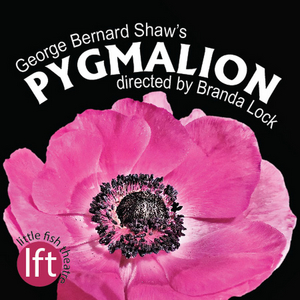
How a director envisions a production makes all the difference in its prestation to an audience, starting with casting and continuing through rehearsals and all technical aspects of the show. The past year has been a challenging one for all of us involved with theatre, given the continuing shutdown of all indoor shows which led us to learning the intricate ways of presenting shows online which offered more than just a static reading of the work.
One of the first Zoom interactive productions I attended last July was "Romeo & Juliet: Choose Your Own Ending" directed by Branda Lock for Little Fish Theatre in San Pedro, in which the audience members were asked to make decisions at specific moments to make choices on which action should be taken. I mean, hasn't everyone wished if only Romeo had gotten the note or Juliet woke up sooner? Thus, each of the performances (and I attended both) changed completely from the characters featured to the story line itself. The memory of being involved as an audience member still remains a highlight of last year's pandemic theatre lockdown to me!
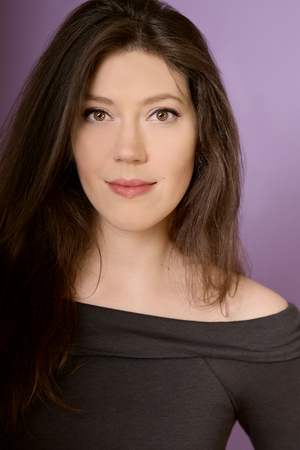 And now Branda Lock (pictured) is bringing her vivid imagination and directing skills to George Bernard Show's PYGMALION, the first Little Fish Theatre (LFT) production fully-produced and filmed on a set constructed in the theatre's parking lot. Yes, there's a set. Yes, there's costumes. And yes, there are unique Lock-inspired changes to the casting which promise to shed new light on this classic tale of class struggles in Shaw's time.
And now Branda Lock (pictured) is bringing her vivid imagination and directing skills to George Bernard Show's PYGMALION, the first Little Fish Theatre (LFT) production fully-produced and filmed on a set constructed in the theatre's parking lot. Yes, there's a set. Yes, there's costumes. And yes, there are unique Lock-inspired changes to the casting which promise to shed new light on this classic tale of class struggles in Shaw's time.
(Shari): It's good to speak with you about your vision for a classic tale presented in a totally modern way. Tell me more about your vision for PYGMALION.
(Branda): I am so excited to be directing my first in-person show in over a year. On top of that this is my most favorite of Shaw's plays! I think Shaw is one of those classical playwrights that really stands up against the test of time, more so than many others. He was a feminist and socialist (not to mention pacifist, vegetarian, humanist, and atheist) way ahead of his time. And almost all of his plays deal with the problem of deep-rooted class division and patriarchy.
(Shari): In what ways are you re-interpreting his vision?
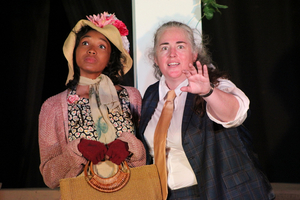 (Branda): Well first off by identifying and exploring the deeply imbedded themes of feminism and classism Shaw already addresses in his "suffragette play" - and even the musical "My Fair Lady" - although to lesser extent than the play that it was based upon (Shaw was strongly against the ending of "My Fair Lady"). But I wanted to up the ante, so to speak, by looking at the barriers to feminism within the female world - a.k.a. reimagining Henry Higgins as Henrietta Higgins (Margaret Schugt, pictured), and by looking at the huge obstacles of classism when you bring race marginality to the conversation - a.k.a. intentionally casting Eliza (Sydnée Grant, pictured) and Alfred Doolittle (Dan Smalls, pictured below) as black actors. I like to think this is a modern raising of the stakes as well as a different angle Shaw would be interested in exploring in his play PYGMALION.
(Branda): Well first off by identifying and exploring the deeply imbedded themes of feminism and classism Shaw already addresses in his "suffragette play" - and even the musical "My Fair Lady" - although to lesser extent than the play that it was based upon (Shaw was strongly against the ending of "My Fair Lady"). But I wanted to up the ante, so to speak, by looking at the barriers to feminism within the female world - a.k.a. reimagining Henry Higgins as Henrietta Higgins (Margaret Schugt, pictured), and by looking at the huge obstacles of classism when you bring race marginality to the conversation - a.k.a. intentionally casting Eliza (Sydnée Grant, pictured) and Alfred Doolittle (Dan Smalls, pictured below) as black actors. I like to think this is a modern raising of the stakes as well as a different angle Shaw would be interested in exploring in his play PYGMALION.
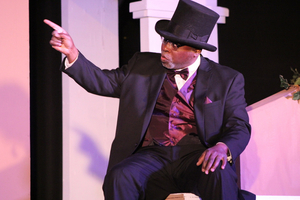 (Shari): Has any of Shaw's script been altered to ensure the production is "politically correct" given today's Black Lives Matter movement, or do his words lend themselves to the disparity between races?
(Shari): Has any of Shaw's script been altered to ensure the production is "politically correct" given today's Black Lives Matter movement, or do his words lend themselves to the disparity between races?
(Branda): New to Little Fish Theatre, dramaturg Debra Ann Byrd (Artistic Director of Harlem Shakespeare Festival) brings her expertise of using race intentionally within the classics. She says, "Using theatre as a medium to frame conversations about racism and/or feminism is a great way to get people talking to each other about those sometimes difficult and challenging topics. Telling well-loved classic stories through these kinds of new lenses can serve to help make the world a better place. And at the end of the day, that is exactly what we who make theatre are after."
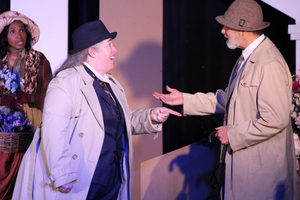 Because Shaw was such a progressive in his day there really were very few changes that needed to be made. Of course, we changed all of the gender pronouns to suit a Henrietta versus a Henry Higgins. I believe in addition to that, we only changed one archaic brand name, cut the hyperbolic use of the word "slave" once, and rewrote another hyperbolic reference about men shooting themselves in the streets for Eliza. The rest of the more controversial words and references (i.e., words like blackguard, monkey, and slave) the cast, our dramaturg, Debra Ann Byrd, and I talked about in depth in rehearsals and all came to an agreement to let them stand as they were to further emphasize for our audiences the class (and in our case, racial) disparities Shaw purposefully wanted to point out in this play.
Because Shaw was such a progressive in his day there really were very few changes that needed to be made. Of course, we changed all of the gender pronouns to suit a Henrietta versus a Henry Higgins. I believe in addition to that, we only changed one archaic brand name, cut the hyperbolic use of the word "slave" once, and rewrote another hyperbolic reference about men shooting themselves in the streets for Eliza. The rest of the more controversial words and references (i.e., words like blackguard, monkey, and slave) the cast, our dramaturg, Debra Ann Byrd, and I talked about in depth in rehearsals and all came to an agreement to let them stand as they were to further emphasize for our audiences the class (and in our case, racial) disparities Shaw purposefully wanted to point out in this play.
(Shari): How did you two connect before and/or during the production?
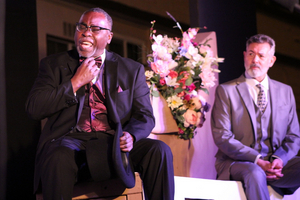 (Branda): Debra Ann and I met via Zoom during casting and talked about the play at length and about the goals and vision we wanted to achieve with this production. We then met during our Zoom rehearsals with the actors where she was able to give her wealth of knowledge about the play, Shaw, and the given circumstances of the play to the cast in her dramaturgical presentation at our first read thru as well as further dialogue and input throughout rehearsals to the actors and myself. It was an awesome collaboration and I learned so much from her and her perspective and experience.
(Branda): Debra Ann and I met via Zoom during casting and talked about the play at length and about the goals and vision we wanted to achieve with this production. We then met during our Zoom rehearsals with the actors where she was able to give her wealth of knowledge about the play, Shaw, and the given circumstances of the play to the cast in her dramaturgical presentation at our first read thru as well as further dialogue and input throughout rehearsals to the actors and myself. It was an awesome collaboration and I learned so much from her and her perspective and experience.
(Shari): Who is featured in the cast?
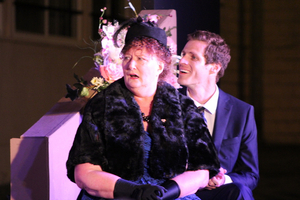 (Branda): Little Fish's production stars company member Margaret Schugt as Henrietta and introduces recent USC B.F.A. graduate, Sydnée Grant, as Eliza. Rounding out the cast are mix of company members and guest artists (*denotes AEA, +denotes LFT company member), including Warren Davis (Colonel Pickering), Shirley Ritter Hatton*+ (Mrs. Eynsford-Hill/Mrs. Pearce, pictured), Michele Shultz* (Mrs. Higgins), Dan Smalls* (Alfred Doolittle), and Connor Sullivan* (Freddy Eynsford-Hill, pictured). All cast members double throughout to cover the small roles that build this world around Henrietta and Eliza.
(Branda): Little Fish's production stars company member Margaret Schugt as Henrietta and introduces recent USC B.F.A. graduate, Sydnée Grant, as Eliza. Rounding out the cast are mix of company members and guest artists (*denotes AEA, +denotes LFT company member), including Warren Davis (Colonel Pickering), Shirley Ritter Hatton*+ (Mrs. Eynsford-Hill/Mrs. Pearce, pictured), Michele Shultz* (Mrs. Higgins), Dan Smalls* (Alfred Doolittle), and Connor Sullivan* (Freddy Eynsford-Hill, pictured). All cast members double throughout to cover the small roles that build this world around Henrietta and Eliza.
(Shari) Most importantly since the actors do appear in-person together on the set, how did you ensure that all Covid-19 safety protocols were met for the cast and production team? Is the cast wearing masks during the show itself or were they required to get vaccinated before recording?
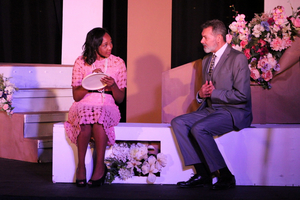 (Branda): I am so thrilled to work with this incredible cast and crew, so of course I worked hand-in-hand with LFT on how to best ensure their safety. Lisa Coffi, Little Fish Theatre's artistic director became certified as a COVID-19 Compliancy Officer and ensured that the cast and crew followed all of the state, city, and local COVID-19 compliancy and safety rules.
(Branda): I am so thrilled to work with this incredible cast and crew, so of course I worked hand-in-hand with LFT on how to best ensure their safety. Lisa Coffi, Little Fish Theatre's artistic director became certified as a COVID-19 Compliancy Officer and ensured that the cast and crew followed all of the state, city, and local COVID-19 compliancy and safety rules.
We all had to be tested 48-24 hours before our first in person rehearsals (we only had three in person rehearsals and one day to film). Once we arrived at the theatre, we all had our temperatures taken and were required to fill out a COVID-19 survey every day. The stage was built outdoors in Little Fish Theatre's back lot, and all rehearsing and filming was performed outdoors. We were masked the whole time except the actors while filming. And there were hundreds more rules in which Lisa and Tara did a great job making sure we all knew and followed to the letter for everyone's safety.
(Shari): Did cast members share their personal experience with race relations which you incorporated into your vision of the production?
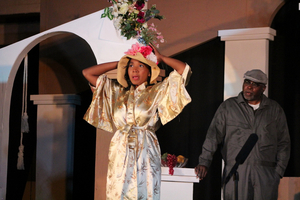 (Branda): As in most productions I direct, actors often share their personal experiences with me while others prefer to keep their personal life separate from their work. I totally respect and admire both approaches to the craft and hold my actors' confidences sacredly.
(Branda): As in most productions I direct, actors often share their personal experiences with me while others prefer to keep their personal life separate from their work. I totally respect and admire both approaches to the craft and hold my actors' confidences sacredly.
(Shari): Tell me about your vision of the set design and building it outdoors at LFT.
(Branda): This is my seventh production with the incredibly talented set designer, Tristan Griffin. He and I have a wonderful artistic collaborative working style and I really enjoy the creative process together. We typically start off making a way-out-there, the-sky-is-the-limit, pretend-you-have-a-million-dollar-budget inspiration board. Then we add the limitations of the given production (budget, time, and scope) which help define the parameters we are working on.
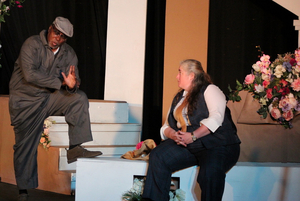 With this production we had a blank canvas stage but needed to work within a unit set scope so we needed various platforms for seating and levels to be able to work as three different locations, one exterior, two interior. As far as the design aesthetic and thematic part, we decided to go with nods to classism referencing the Greek myth upon which PYGMALION is based and wanted to incorporate angular lines and curvatures in the structure of the set to highlight the feminine and masculine components in the structure of the play itself. And of course, adding the flower elements growing out of this structure to give it depth, dimension, and a nod to the protagonist, Eliza Doolittle. And as for working outside, we were blessed with temperate weather and, well, we got our summer base tans for sure!
With this production we had a blank canvas stage but needed to work within a unit set scope so we needed various platforms for seating and levels to be able to work as three different locations, one exterior, two interior. As far as the design aesthetic and thematic part, we decided to go with nods to classism referencing the Greek myth upon which PYGMALION is based and wanted to incorporate angular lines and curvatures in the structure of the set to highlight the feminine and masculine components in the structure of the play itself. And of course, adding the flower elements growing out of this structure to give it depth, dimension, and a nod to the protagonist, Eliza Doolittle. And as for working outside, we were blessed with temperate weather and, well, we got our summer base tans for sure!
(Shari): Costume designer Michael Mullen has been posting about PYGMALION being his first in-person show he has worked on in over a year. Is he designing the production in Shaw's time or updating the costumes per your more modern take on the show?
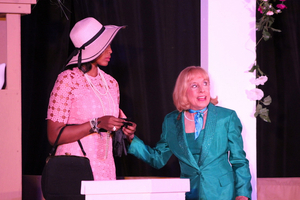 (Branda): Yes, it was many of the cast and crew's first in-person show in over a year, which was just so special! Michael was such a delight to work with and has such an eye for detail, we were so lucky to have him as part of the creative team for this production. Michael and I sat down together (via Zoom) and discussed how I really wanted to keep this production in a more timeless time period, meaning I actually didn't want there to be one very specific time period the audience could reference in the design elements of the show. The reason for this being that I wanted the bold casting choices to stand on their own. So Michael and I decided to blend many time periods since the plays inception in 1912, tipping our hat, so to speak, at some of PYGMALION'S most successful and Popular Productions from 1913, 1938, 1964, 1984, 2007, to today!
(Branda): Yes, it was many of the cast and crew's first in-person show in over a year, which was just so special! Michael was such a delight to work with and has such an eye for detail, we were so lucky to have him as part of the creative team for this production. Michael and I sat down together (via Zoom) and discussed how I really wanted to keep this production in a more timeless time period, meaning I actually didn't want there to be one very specific time period the audience could reference in the design elements of the show. The reason for this being that I wanted the bold casting choices to stand on their own. So Michael and I decided to blend many time periods since the plays inception in 1912, tipping our hat, so to speak, at some of PYGMALION'S most successful and Popular Productions from 1913, 1938, 1964, 1984, 2007, to today!
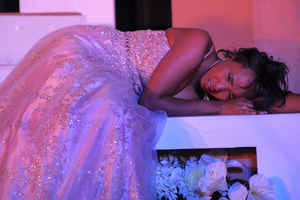 (Shari): Will the first performance on Saturday, May 15 at 7pm be presented live and recorded to be then streamed on demand on You Tube through Sunday, May 30th at 11pm? Or are all performances pre-recorded?
(Shari): Will the first performance on Saturday, May 15 at 7pm be presented live and recorded to be then streamed on demand on You Tube through Sunday, May 30th at 11pm? Or are all performances pre-recorded?
(Branda): We did a live filmed run of the play on May 1st, where we had a six-camera set up from multiple angles with two camera operators doing close ups. We are currently in post-production editing and sound designing/editing. Once the edit is complete, the final product of our live-filmed run thru will be released May 15th at 7:00 PM and available through May 30th by 11:00 PM.
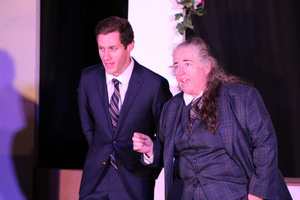 (Shari): Are there any details we have left out that you wish to share?
(Shari): Are there any details we have left out that you wish to share?
(Branda): I'd really like to thank the cast and crew for embarking with me on what was a whirlwind rewarding experience! We rehearsed and mounted this play in 35 hours - only 19 of which were in person and were able to compensate our actors and crew despite COVID-19! This experience would not have been possible without Lisa Coffi, Tara Donovan, Little Fish Theatre and all of its patrons and donors, and I just want to thank them from the bottom of my heart for making this show a reality.
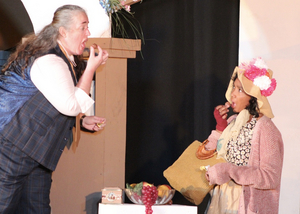 Thanks so much Branda for taking the time to speak with me about the show! Be sure to tune in for Little Fish Theatre's 2021 latest offering in its Virtual Season, and for director Branda Lock bringing new life to PYGMALION in a fully-staged production available to audiences in their homes via You Tube at 7pm on Saturday, May 15th and running on demand through Sunday, May 30th at 11pm. Tickets are $20 and can be purchased online at www.littlefishtheatre.org Running time approx. 2 hours.
Thanks so much Branda for taking the time to speak with me about the show! Be sure to tune in for Little Fish Theatre's 2021 latest offering in its Virtual Season, and for director Branda Lock bringing new life to PYGMALION in a fully-staged production available to audiences in their homes via You Tube at 7pm on Saturday, May 15th and running on demand through Sunday, May 30th at 11pm. Tickets are $20 and can be purchased online at www.littlefishtheatre.org Running time approx. 2 hours.
Photo credit: Tara Donovan
Comments

Videos

